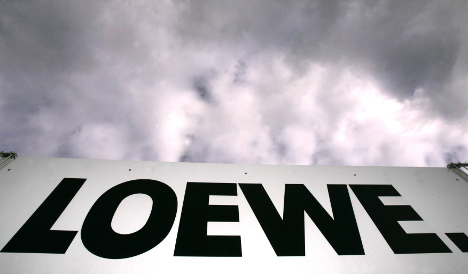Ironically, it is also hoping that its saviour would hail from Asia, the very region which is at the root of many of its current woes.
Asked by Der Spiegel magazine whether Loewe would still exist in 12 months’ time, the group’s chairman Matthias Harsch replied: “That’s the question I ask myself every morning. For the time being, my answer is still ‘yes’.”
But Loewe’s future is looking anything but rosy and the prospect of bankruptcy is looming ever larger over a company whose long years of losses have already eaten up half of its capital.
Last week, Loewe, which was set up by two brothers in Berlin in 1923, opted to apply for protection from its creditors, giving itself three months to find new investors prepared to finance a re-launch of the company.
Harsch told Der Spiegel he had been in talks with investors in Asia, saying the most likely partners would be Chinese makers such as TCL, Changhong, Skyworth and Hisense.
The partner would deliver “the major hardware components — processors, circuit boards and screens,” he said.
During the group’s previous crisis, it was Japanese group Sharp that came to its rescue, taking a 30-percent stake in Loewe’s share capital.
But Sharp, too, is making losses and is therefore in no position to help its German partner this time.
Loewe specialises in high-end equipment like flat-screen TVs that sell for up to €5,000 each. But it has been hit by the competition from lower-cost rivals in Asia as well as the increasing saturation of the market.
As a result, Loewe is looking to reposition itself and develop “a new price strategy,” and hopes in future to offer TV sets “at the lower end of the premium market”.
Loewe’s woes mirror the overall trend in the once flourishing German market of TV set manufacturers.
Alongside Loewe, the sole survivors are the two companies Metz and Technisat, hardly household names, and small compared with giants such as Samsung and Panasonic.
Grundig continues to exist as a brand, but was acquired a number of years ago by the company that owns the Turkish brand Beko.
Telefunken is practically no longer present in the TV set market, and Blaupunkt, a former subsidiary of Bosch, is better known for its car radios which are made in Malaysia.
“The price war is huge. Competition has exploded over the past 10 years, driven primarily by new Asian makers,” the head of Metz, Norbert Kotzbauer, said in a recent interview.
“For a while, we tried to compensate with ever larger screens. But there is clearly a lot of overcapacity in the market,” he said.
Metz has found itself a niche in the market for very high-end products in order to survive.
Loewe filed for creditor protection under a new instrument under German law, called Schutzschirmverfahren, aimed at making it easier for indebted but nonetheless viable businesses to restructure.
Businesses which apply for it are still technically bankrupt, but they are given three months to restructure, while for the most part still maintaining control of their business.
Loewe has slashed its workforce by around 20 percent to 800 since the beginning of this year.
AFP/hc



 Please whitelist us to continue reading.
Please whitelist us to continue reading.
Member comments